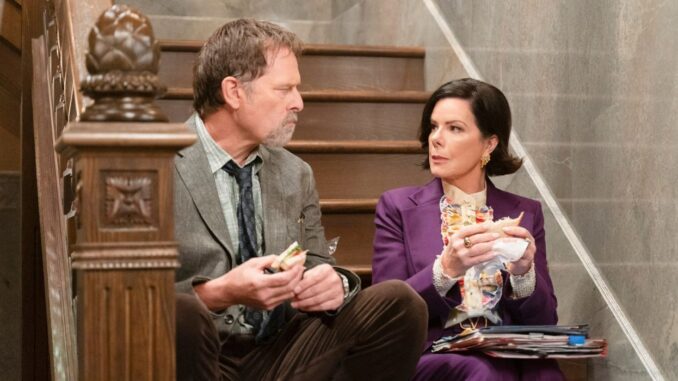
The Case of the Cancelled Consultant: Why CBS Pulled the Plug on "So Help Me Todd"
"So Help Me Todd," a quirky dramedy about a by-the-book lawyer and her eccentric, directionless son-turned-investigator, felt like a breath of fresh air in the typically procedural landscape of CBS. It offered a compelling mother-son dynamic, a healthy dose of humor, and intriguing mysteries wrapped in a warm, Seattle-esque aesthetic. Yet, despite a dedicated fanbase and moments of genuine brilliance, the show was cancelled after just two seasons. The reasons for its demise are a complex cocktail of factors, ranging from network strategy and evolving priorities to production costs and, ultimately, the show's own inconsistent performance.
One of the most significant factors contributing to the cancellation was CBS's overall strategic shift. The network, known for its reliably high-rated procedurals and comfortable demographic appeal, has been increasingly focused on appealing to a younger audience and building its streaming platform, Paramount+. While "So Help Me Todd" boasted a loyal viewership, it skewed towards an older demographic, a group less actively engaged with streaming services and less valuable to advertisers. CBS's renewed emphasis on attracting younger viewers, through shows like "Tracker" and "Elsbeth," likely pushed "So Help Me Todd" down the priority list. The network may have perceived the show as not aligning with its long-term vision, favoring instead programs that could more readily drive subscriptions to Paramount+.
Furthermore, the show's production costs likely played a significant role in the decision. Filmed in Vancouver, "So Help Me Todd" benefited from Canada's generous tax incentives, but still required a substantial budget to maintain its quality. The complex legal storylines, the location shooting, and the salaries of a talented ensemble cast all added up. In the increasingly competitive television landscape, networks are constantly evaluating the return on investment for each show. If a show's ratings aren't consistently high enough to justify its production costs, cancellation becomes a viable, albeit painful, option.
While the show had a strong core fanbase, its ratings performance was uneven. While the show consistently performed well in delayed viewing, thanks to its availability on Paramount+, its live viewership, the metric most valued by advertisers, fluctuated throughout its two seasons. This inconsistency made it difficult for the network to justify renewing the show, especially given the other factors at play. The network needs reliable ratings to secure lucrative advertising deals, and the fluctuating numbers of "So Help Me Todd" likely made it a less attractive option compared to more stable performers.
Beyond network strategy and financial considerations, the show itself faced internal challenges. While the dynamic between Margaret (Marcia Gay Harden) and Todd (Skylar Astin) was the show's strongest asset, the supporting characters often felt underdeveloped, and the storylines occasionally leaned into predictable tropes. The series struggled at times to maintain a consistent tone, oscillating between lighthearted comedy and darker, more serious drama. This tonal inconsistency, while not necessarily a fatal flaw, could have contributed to viewer fatigue and a perceived lack of direction.
Finally, the increasingly crowded television landscape played a role. With a seemingly endless array of streaming services and television channels vying for viewers' attention, the competition is fierce. Shows need to stand out and capture the audience's imagination to survive. While "So Help Me Todd" had its unique charm, it might not have been distinct enough to cut through the noise and secure a larger audience. The pressure to constantly innovate and deliver groundbreaking content likely contributed to the network's decision to invest in other, potentially more promising projects.
In conclusion, the cancellation of "So Help Me Todd" was not the result of a single, definitive reason, but rather a confluence of factors that converged to seal its fate. Network strategy, production costs, inconsistent ratings, internal creative challenges, and the sheer competitiveness of the television landscape all played a part. While the show's passionate fanbase was undoubtedly disappointed, the decision ultimately reflects the realities of the modern television industry, where even shows with strong potential can fall victim to evolving priorities and the relentless pursuit of ratings gold. "So Help Me Todd" may be gone, but its legacy as a quirky, heartfelt dramedy with a truly unique mother-son duo will likely endure for its devoted viewers.
